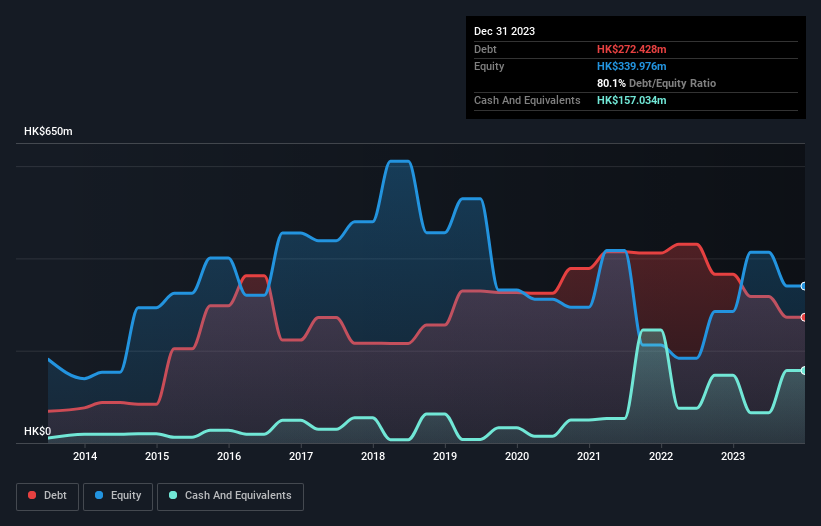Kiu Hung International Holdings (HKG:381) Use Of Debt Could Be Considered Risky

The external fund manager backed by Berkshire Hathaway's Charlie Munger, Li Lu, makes no bones about it when he says 'The biggest investment risk is not the volatility of prices, but whether you will suffer a permanent loss of capital.' So it might be obvious that you need to consider debt, when you think about how risky any given stock is, because too much debt can sink a company. Importantly, Kiu Hung International Holdings Limited (HKG:381) does carry debt. But the real question is whether this debt is making the company risky.
What Risk Does Debt Bring?
Debt assists a business until the business has trouble paying it off, either with new capital or with free cash flow. If things get really bad, the lenders can take control of the business. However, a more usual (but still expensive) situation is where a company must dilute shareholders at a cheap share price simply to get debt under control. Having said that, the most common situation is where a company manages its debt reasonably well - and to its own advantage. The first step when considering a company's debt levels is to consider its cash and debt together.
Check out our latest analysis for Kiu Hung International Holdings
What Is Kiu Hung International Holdings's Debt?
As you can see below, Kiu Hung International Holdings had HK$272.4m of debt at December 2023, down from HK$365.8m a year prior. However, because it has a cash reserve of HK$157.0m, its net debt is less, at about HK$115.4m.

How Healthy Is Kiu Hung International Holdings' Balance Sheet?
The latest balance sheet data shows that Kiu Hung International Holdings had liabilities of HK$277.3m due within a year, and liabilities of HK$153.0m falling due after that. Offsetting this, it had HK$157.0m in cash and HK$57.3m in receivables that were due within 12 months. So it has liabilities totalling HK$216.0m more than its cash and near-term receivables, combined.
This deficit casts a shadow over the HK$30.6m company, like a colossus towering over mere mortals. So we'd watch its balance sheet closely, without a doubt. After all, Kiu Hung International Holdings would likely require a major re-capitalisation if it had to pay its creditors today.
We use two main ratios to inform us about debt levels relative to earnings. The first is net debt divided by earnings before interest, tax, depreciation, and amortization (EBITDA), while the second is how many times its earnings before interest and tax (EBIT) covers its interest expense (or its interest cover, for short). The advantage of this approach is that we take into account both the absolute quantum of debt (with net debt to EBITDA) and the actual interest expenses associated with that debt (with its interest cover ratio).
While we wouldn't worry about Kiu Hung International Holdings's net debt to EBITDA ratio of 4.1, we think its super-low interest cover of 0.55 times is a sign of high leverage. So shareholders should probably be aware that interest expenses appear to have really impacted the business lately. Even worse, Kiu Hung International Holdings saw its EBIT tank 53% over the last 12 months. If earnings continue to follow that trajectory, paying off that debt load will be harder than convincing us to run a marathon in the rain. The balance sheet is clearly the area to focus on when you are analysing debt. But it is Kiu Hung International Holdings's earnings that will influence how the balance sheet holds up in the future. So if you're keen to discover more about its earnings, it might be worth checking out this graph of its long term earnings trend.
Finally, while the tax-man may adore accounting profits, lenders only accept cold hard cash. So the logical step is to look at the proportion of that EBIT that is matched by actual free cash flow. During the last two years, Kiu Hung International Holdings burned a lot of cash. While investors are no doubt expecting a reversal of that situation in due course, it clearly does mean its use of debt is more risky.
Our View
On the face of it, Kiu Hung International Holdings's EBIT growth rate left us tentative about the stock, and its level of total liabilities was no more enticing than the one empty restaurant on the busiest night of the year. And furthermore, its interest cover also fails to instill confidence. Considering everything we've mentioned above, it's fair to say that Kiu Hung International Holdings is carrying heavy debt load. If you play with fire you risk getting burnt, so we'd probably give this stock a wide berth. There's no doubt that we learn most about debt from the balance sheet. However, not all investment risk resides within the balance sheet - far from it. For example, we've discovered 2 warning signs for Kiu Hung International Holdings that you should be aware of before investing here.
If, after all that, you're more interested in a fast growing company with a rock-solid balance sheet, then check out our list of net cash growth stocks without delay.
New: Manage All Your Stock Portfolios in One Place
We've created the ultimate portfolio companion for stock investors, and it's free.
• Connect an unlimited number of Portfolios and see your total in one currency
• Be alerted to new Warning Signs or Risks via email or mobile
• Track the Fair Value of your stocks
Have feedback on this article? Concerned about the content? Get in touch with us directly. Alternatively, email editorial-team (at) simplywallst.com.
This article by Simply Wall St is general in nature. We provide commentary based on historical data and analyst forecasts only using an unbiased methodology and our articles are not intended to be financial advice. It does not constitute a recommendation to buy or sell any stock, and does not take account of your objectives, or your financial situation. We aim to bring you long-term focused analysis driven by fundamental data. Note that our analysis may not factor in the latest price-sensitive company announcements or qualitative material. Simply Wall St has no position in any stocks mentioned.
About SEHK:381
AOM International Group
An investment holding company, manufactures and trades in toys and gifts.
Mediocre balance sheet low.
Market Insights
Community Narratives



